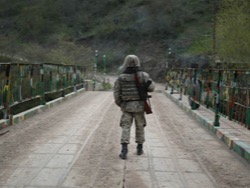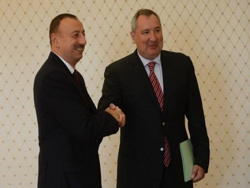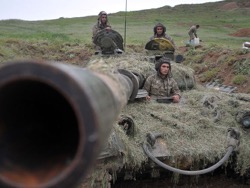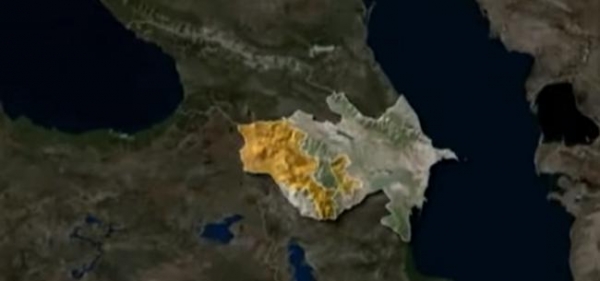
The Caucasus region, more recently, to stand in the shadow of the Ukraine and the Middle East, again reminded of itself. The first week of April, the world watched the fighting around Karabakh. After several days of armed clashes and a truce is possible to formulate a few preliminary conclusions from the happened.
The arguments for all
First of all, we cannot say that the intensification of the conflict was just too sudden. Incidents on the contact line and along the internationally recognized Armenia-Azerbaijan border outside Karabakh itself occurred earlier. Their number increases, until I moved into quality. And now we observed the largest military conflicts since the entry into force of the Agreement on permanent ceasefire of 12 may 1994.
Azerbaijan failed attempt to quickly defeat the infrastructure of the unrecognized Republic similar to the one that carried out the Croatian military and volunteer formations in the Serbian Krajina in 1995. Therefore, and radical demolition of the existing status quo. The possibilities of the conflicting parties were tested, but significant policy changes — for example, to accelerate the recognition of the independence of the Nagorno Karabakh Republic by Armenia or return under Azerbaijani control of a significant part occupied by Armenian forces of districts is not led.
Military conflict was localized, and they were replaced by intensive diplomatic contacts: visits of Dmitry Medvedev and Sergey Lavrov in Baku and Yerevan, the meeting of the co-chairs of the OSCE Minsk group. But all this does not mean a quick solution to the conflict. On the contrary, the contradictions have aggravated. Armenia has found another confirmation of my argument about the lack of reliable security guarantees for Karabakh, and Azerbaijan – the argument that the promise to restore its territorial integrity by peaceful diplomatic means no hurry to perform. In fact, speech can go not about restoring, and establishing, as in the period after the collapse of the Soviet Union independent state of Azerbaijan does not exercise effective control over the former Nagorno-Karabakh Autonomous region.
Consequently, military alarm, similar to what we observed in April 2016, in the future, absolutely not excluded. The hot spot of the Caucasus there are no peacekeepers, but the truce still held the balance of power, which is not constant. When any change of ethno-political confrontation could be defrosted. The more that Yerevan and Baku continues to insist on their maximum demands, and the co – chair countries of the OSCE Minsk group mediating in the peace process, do not have the tools sufficient to coerce the parties towards compromise solutions.
The formulae of mutual concessions that mediators offer to the parties, is also not good enough. The so-called “updated Madrid principles”, which revolves around the negotiation process, contain sometimes conflicting theses. On the one hand, it is the commitment to “territorial integrity” of Azerbaijan, and with another – legally binding referendum on status of Nagorno-Karabakh. But is the results of people’s will predetermined, and sharpened by the idea of Azerbaijani unity? Especially if nobody will give guarantees that its results cannot be contested and Yerevan, and Baku.
Without proxy
However, Karabakh alternatives are not reduced to the choice between final peaceful settlement and war. The situation of “neither peace nor war” can last for years because it is defined not by the spells of “the impossibility of a military solution” (many of the ethnopolitical conflicts from the Balkans to Sri Lanka was solved just by force) and different balances of forces and interests, which should not necessarily be assumed to be the most acceptable option nor the unfreezing of the conflict, no working formula out of it.
In Transcaucasia in the 25 years since the collapse of the USSR it is possible to speak about a consistent change in two status quo. The first was accompanied by the process of divorce in the Caucasus, which was not peaceful: four armed conflict and four unrecognized entity, not to mention the hundreds of thousands of refugees and numerous victims. According to the results of the confrontation were frozen, but not resolved, as the exclusive mediator in the settlement of them was Russia, and in this capacity, she was recognized as the U.S. and its allies.
But this situation suited not all. She pushed for the revision of the disadvantageous status quo in those States that have suffered from secessia. This is the place to search for the beginnings of the internationalization of the conflicts of the Caucasus, which began in search of foreign policy alternatives privileged location in Moscow. And that this quest led to the unfreezing conflict in South Ossetia and Abkhazia in 2004-2008 and the second the status quo, which established two parallel political and legal reality: the same the territory of the former autonomy of the Georgian SSR exist as independent States, and occupied Russian territory of independent Georgia.
An important question arises: why is the transition from the first to the second status quo spared Nagorno-Karabakh? Indeed, in 2008, despite some aggravation in the conflict zone (occurred in March), nothing like a failure “Tskhinvali blitzkrieg” did not happen. The answer becomes clear if we take into account one crucial fact: the Armenian-Azerbaijani conflict in contrast to the Georgian-Ossetian or Georgian-Abkhaz was not perceived and not perceived as a proxy conflict, a proxy war between Russia and the West.
Even after Moscow decided to recognize the independence of Abkhazia and South Ossetia, the U.S. did not abandon cooperation with Russia on the Karabakh direction. Moreover, in the period infamous “reset” Washington has openly supported the tripartite negotiation format (Armenia, Azerbaijan and Russia) of the Minsk over the existing process. Then the three presidents of the countries co-chairs reached consensus on the updated Madrid principles as a starting formula for a peaceful settlement.
In the end, the basis of the second status quo was the loss by Russia of its former position exclusive arbiter of the Caucasus conflict (the question of justice arbitration is a separate issue). De facto there was a division of spheres of influence: Pro-Western Georgia, was released from Russian influence, and two of its former autonomy as the Republic of the customers of Russia. At the same time Moscow could afford a certain balancing between Armenia and Azerbaijan, maintaining the status quo in the Karabakh conflict zone and not having there special differences with the West.
But times change, and replaced the cautious optimism came hard confrontation, which could not but affect the situation in Transcaucasia. Although neither Crimea nor Donbass have not changed the fundamental U.S. approaches to the Karabakh settlement, the logic of confrontation of the West and Russia has urged Armenia and Azerbaijan to check on the reaction intermediaries in emerging incidents and attempt without their sanctions change things. Of course, greater activity in this way has developed Azerbaijan, simply because he never hid his dissatisfaction with the existing status quo. Note that this check concerns not only Karabakh plots, but also relations of States to human rights defenders, the media and foreign NGOs. All this raised the stakes in the game and unraveled the spiral of confrontation long before the current exacerbation.
Wider circle
The development of the Karabakh conflict has shown that under current conditions a good agreement between Washington and Moscow (and even their selective interaction in different fields) is not enough. The confrontation between Russia and Turkey has become an additional factor in the aggravation of the situation. This, of course, not on direct orders from Ankara to Baku, but definitely about trying to use the Turkish factor for the possible containment of external forces (including both the West and Russia). In this context, is not accidental looks critical the pathos of President Recep Tayyip Erdogan in relation not only to Russia but to the entire OSCE Minsk group. Because the very fact that public solidarity Ankara and Baku is designed to cool the ardor of anyone who would like to influence the Karabakh peace process.
It is no coincidence that the presence at the talks with Sergei Lavrov, Iranian foreign Minister. Tehran, extremely disinterested in the internationalization of the Caucasus, would like to maintain the delicate balance in Karabakh. After all, if the blitz fails, the tightening of confrontation will put the question on sending international peacekeepers or enhance diplomatic, intelligence and other missions, with all the ensuing consequences.
For Russia the complete defrosting of the conflict is extremely profitable. This will jeopardize the prospects of the Eurasian integration structures. Actually, April the aggravation has caused an unprecedented surge “of europocentrism” in Armenia and “armianskaia” in Belarus and Kazakhstan. The failure of the Minsk process, if it happens (when you break the current status quo it is inevitable), will equalize Russia with all other parties and, on the contrary, will enhance the role of Turkey and Iran in addition to the West, which is not going anywhere.
The same loss of Nagorno Karabakh will put a thick line under the Russian-Armenian Alliance, despite the fact that Azerbaijan in this case, the friendship with Russia is not really needed. In economic terms, Baku are a member of the Western energy projects, and as such violation of human rights is not so important.
In this case, the unfreezing of the conflict, strengthening the relationship with Baku, Ankara, and raises concerns in Tehran and Washington who are tired of impromptu foreign policy of Turkey in the middle East. However, for Turkish interests in the region facing threats, because Moscow, as the events around Georgia or Ukraine, in the case of hard pressure, it will behave quite differently, as leaders of Serbia in 1995, and intervene.
Moreover, the escalation of violence and threat for Yerevan and Baku. Armenia is a high risk time to lose all that has been mined in the first the status quo. And for Azerbaijan, there is a risk of internal destabilization, if the war continues and will not bring the fruits that were promised in brave performances.
Consequently, there is albeit paradoxical, but the basis in order to keep the conflict within certain banks and to prevent a precipitous change. This does not bring a solution to the conflict. On the contrary, the situation of “neither peace nor war” could be delayed indefinitely. This period will not necessarily be a stalemate – he can be accompanied by military, political and diplomatic testing to the point, while some will (joint or unilateral) will not offer the parties some semblance of camp David. Or until a new alarm will not break already erased to limit the thread completely.
In any case, have been trying hard the second revision of the status quo, where Karabakh remained in a frozen state. As a result, there are some signs until the third, but updated the second the status quo, where not only the West and Russia, but also the nearest neighbors, and the sides play a very active role.







